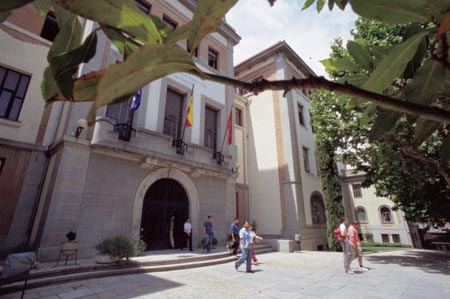I’m sitting upright in an enclosed metal box, swiftly moving at 70 miles per hour. Darkness all around me, heat cannot escape, there is no ventilation. It’s a sweaty person’s nightmare. I am focusing on my breathing, in through the nose, out through the mouth. To no avail, my giant sweat glands are winning. A drop slowly makes its way down my forehead, hot lava oozing out of my pores. Then another drop. And another. Now, drenched in sweat, looking as if I just got out out of Bikram yoga, I open my eyes. A Spanish grandma across the Metro is handing me a pack of tissues. I refuse, embarrassed. She gestures fervently for me to take the tissues to wipe my sweat. I take them – not only did I need them but the Spanish elderly are unusually forceful on the Metro. Nevertheless, problem solved.
I often find myself hustling to catch the Metro for my hour-long commute to school, and although some days I show up to University of Antonio Nebrija a little sweaty, my time at this university has been swell. The school is small, about two thousand students, with a good portion of Americans studying abroad. My classes are about 7-12 people in each class, and I’m taking four in Spanish and one in English. In my Spanish classes, I’m learning proper Spanish grammar and how to write effectively in various settings, but fortunately this formal education is effectively balanced by our daily dosage of Spanish slang and “chistes verdes” which literally translates as “green jokes” but is their way of saying inappropriate jokes.
 |
| Main entrance to University Antonio Nebrija. |
My professors are wonderful. We address them all on a first-name basis. They are laid back, relaxed, friendly, and never fail to provide us insight into Spanish culture, as well as other European culture. Juan high-fives us all in class throughout the period and assures us Spain is the best at two things: oranges and good sunshine, the Florida of Europe. Maria Angeles encourages us to use our knowledge of the “street words” when we speak in her class, so we can really be immersed in Spanish culture, regardless of the vulgarity of those words (I’m careful not to use those words at the dinner table with Paloma and Juan). And finally Alicia, who claims that Spain has the longest and simultaneously least productive workday due to all of their coffee breaks and laidback lifestyle. A businesswoman herself, she says they do not set end times for business meetings in Spain because they can go for as long as 4 to 5 hours.
Being at this university, I have been able to observe and befriend Spaniards. They can be found in the library, playing foosball in the cafeteria, and playing football outside. Wherever they are, they are always in groups of at least four people. Spanish culture is very social and extroverted, and the importance of spending time with friends and other compañeros is evident all over the school. Rather than seeing hordes of students not talking, buried in their books in the libraries, everyone seems to be “working” in a group. I can see where the longer work days could come from that my teacher talked about.
Overall, college in Spain has been a refreshing change of pace from the culture I am used to and my large lecture halls at Michigan. And thanks to all of the slang I am learning in class, next time I am sweating on the Metro, I will know if I am the butt of a chiste verde (pun intended).
 |
| An empty hallway in the University - a rarity except on Fridays. |
Danny Pasternak is the Spring 2015 CEA MOJO Blogger in Madrid, Spain. He is currently a junior at the University of Michigan.







